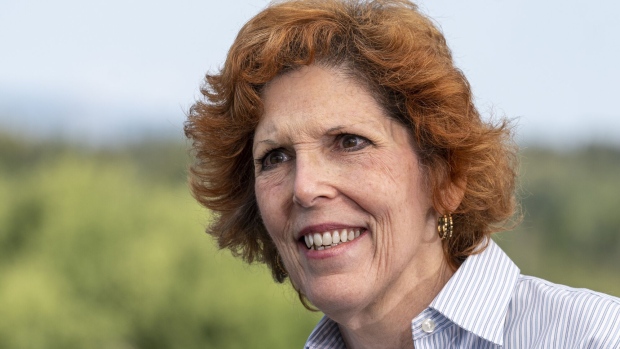Jan 11, 2024
Fed’s Mester Says March Is Probably Too Early for a Rate Cut
, Bloomberg News

(Bloomberg) -- Federal Reserve Bank of Cleveland President Loretta Mester said it was premature to consider cutting interest rates as soon as the US central bank’s March meeting, emphasizing that fresh inflation data suggests policymakers have more work to do.
“I think March is probably too early in my estimate for a rate decline because I think we need to see some more evidence,” Mester, who votes on interest-rate decisions this year, said Thursday in an interview with Michael McKee on Bloomberg TV. “I think the December CPI report just shows there’s more work to do, and that work is going to take restrictive monetary policy.”
As policymakers see more evidence inflation is on a sustainable path to 2%, “we’ll have that conversation,” she added, also citing inflation expectations as an important factor.
Government data released Thursday showed inflation picked up in the year through December, reflecting higher housing costs and an unexpected increase in used vehicle prices. The consumer price index rose 3.4% from a year earlier, the most in three months, while prices excluding food and energy cooled only slightly less than forecast to 3.9%.
Read More: US Inflation Accelerates, Tempering Case for Fed to Cut Rates
Mester said the latest figures reinforced her view that policy is in a good position to assess incoming data on prices and employment.
“Obviously we don’t want to see the progress in inflation stall out but I don’t think this report suggests that’s happening,” she said. “It just suggests we have more work to do, and we’re committed to doing it.”
Fed officials raised rates to a range of 5.25% to 5.5% in July, a 22-year high, but have left policy unchanged since then as inflation has continued to cool. None of the 19 policymakers see rates moving higher, according to economic forecasts released following their December meeting, signaling the next policy move is likely a rate cut.
Markets rallied after the apparent policy pivot, and investors continue to see the first rate cut coming as early as March.
More Voices
Later on Thursday, Richmond Fed President Thomas Barkin reiterated he’s still looking for more evidence that inflation is headed toward the central bank’s goal, noting the CPI report came in “about as expected.”
“What I am looking for is conviction around inflation returning to our target,” Barkin told reporters following an event in Richmond. On the topic of a March rate cut, Barkin said he didn’t want to “prejudge” a decision.
Chicago Fed President Austan Goolsbee agreed, telling Reuters in an interview that it was too soon to make a decision about March.
“I still think that the primary determinant of when and how much rates should be cut will be driven off what’s happening to the inflation data, and are we meeting the mandate goals,” Goolsbee said. “When we have weeks or months of data to come, I don’t like tying our hands... We don’t make decisions about March, June and whatever, in January.”
Mester was among officials who in December forecast three rate cuts in 2024, she told the Financial Times in an interview published Dec. 18. At the time, she said markets were “a little bit ahead” of where policymakers saw rates headed this year.
Risks Remain
The Cleveland Fed chief said Thursday that while she continues to expect a soft landing — where inflation cools but the economy still grows and unemployment remains low — there are risks to that scenario.
“This year is going to be more about looking at the balance now between both parts of our mandate,” she said. “I certainly will be focused on making sure that we continue to get inflation on a sustainable and timely path back to 2% while we can maintain healthy labor-market conditions.”
Mester also said it’d be appropriate for the Fed to begin discussing when to slow the pace of its balance-sheet runoff, known as quantitative tightening, this year. Several policymakers raised the issue at the Fed’s December meeting, and Dallas Fed President Lorie Logan Saturday outlined benchmarks the Fed could use to guide its decision.
“We still have a lot of reserves in the system so we don’t have to do that imminently at all, I think there’s time,” Mester said. “I’m sure this year will be when we start having the conversations and what that plan would look like.”
A vocal supporter of boosting interest rates over the past two years, Mester will vote on this year’s Federal Open Market Committee until she steps down as president of the bank in June, when her tenure ends.
--With assistance from Craig Torres.
(Adds comments from Chicago Fed President Austan Goolsbee starting in 11th paragraph.)
©2024 Bloomberg L.P.






